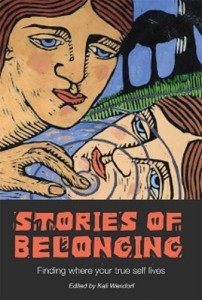The Origins Of Sustainability, By Kelly Wendorf
In our commitment to saving the planet, we are often put at odds with our own species. Ecological destruction seems inevitable as long as humanity is present. How can we be the cure, rather than the disease? Most sustainability initiatives focus on adult-centred change, but what is overlooked are the forging elements that shape a planet-loving, or planet-destroying adult.
Is it in our nature to be violent, fearful and greedy? Or can we nurture humanity towards a different outcome? The answer: a large body of groundbreaking research across a range of disciplines—neuroscience, genetics, psychology and biology—has ended the nurture verses nature debate. Indeed how we are nurtured determines the kind of people we will grow up to be. Even more importantly, we are biologically ‘predispositioned’ towards love, empathy and connection.

The research reveals how these virtues are hard-wired into an infant’s brain by certain sensory inputs such as touch, smell, taste, movement and vision. Specifically these inputs are intimate in nature—breastfeeding, holding, skin-to-skin contact, eye gazing, emotional nurturing, co-sleeping and the movement experienced while being held in the arms of walking carers. Such practices positively alter the developing brain and translate into important developmental advantages: improved relationships and social skills, keen self-management skills and healthy interdependence, a well-functioning nervous system and overall psychological strength and wellbeing.
In addition, there is a neurological ‘expectation’ that these intimate inputs be provided by those who the infant first experienced (through sound and rhythm) in the womb—the mother and father. After that period, the biological need for connection continues, but with the circles expanding to extended family members, a caring community and, very importantly, time in nature—the other mother.
So if we’re hardwired for love, what has gone wrong? Unfortunately, modern western culture is increasingly at odds with this kind of nurturing. Rather than encouraging physical and emotional closeness to children, our culture discourages it. The dissolution of family life and community, and the resultant ‘outsourcing’ of parenting and over reliance of television-as-babysitter interferes with this fragile and critical process of connection.
Ours is a society of disconnect: births are unnecessarily medicalised, interfering in the primary bonding process of mother and infant; babies and toddlers are fed with bottles, sleep alone in their own cot, in their own room and spend an inordinate amount of time in prams, playpens, car seats and day care, away from the physical contact and closeness of their mother and father. And as they grow older, the disconnection expands, with increased time in front of television and computer screens, and little time in nature.
Without a foundation of bonding and connection, children grow up exhibiting a plethora of stress signals that indicate such connections have not been made: depression, attentional issues, aggression, suicide, failure to participate in relationships, and substance abuse. Their ability to look after themselves, another or the planet is highly compromised. And so, in a vicious circle, our disconnected culture raises children who will grow to perpetuate the same disconnection with their children, their neighbours, their earth.
It’s important to look at this research from a civilisational perspective, rather than just a personal one. Many people who read such material often retort with comments such as, ‘Well I was spanked and I am fine’ or ‘My child wasn’t breastfed and she is happy.’ But imagine, if you will, the impact to our planet of generations of western children being raised collectively without the neurobiological imperatives of connection. We’ve heard lately of the looming ‘credit tsunami’; well, this is what I call the looming ‘disconnection tsunami’. And it is heading right for us.
Robin Grille, psychologist and author, is a passionate advocate of uncovering the psychological roots of social and environmental ills. In his groundbreaking book Parenting for a Peaceful World he writes, ‘The suffering of children ends up producing human rights abuses anywhere in the world. Every war, every genocide, has been a direct consequence of society’s war against children.’
Our sustainability initiatives will be frightfully short-sighted until our society realises that how babies are born and raised determines the kind of society that is forged. We can save a forest today, but if children are not brought up feeling love, connection and empathy, then that same forest will be cut down tomorrow. The good news is that for the first time in human history, we have an evidence-based model for how to raise a peaceful society. Until now, parenting methods have been shaped by culture and enforced by societal norms, having little or nothing to do with meeting the emotional, psychological and spiritual needs of humanity. Now science confirms what a mother always knew deep within.
For the first time in human history, we can now take an active and deliberate role in forging a better society and reaching our evolutionary potential to live in harmony with nature and with each other. It will require mothers, fathers and an entire child-loving community.
You can read more of Kelly’s writing at EQUUS, here.

